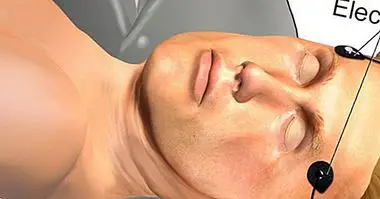Dialectic Behavioral Therapy: theory, phases and effects
The great amount of theories and currents of thought that have existed throughout the history of psychology has allowed that a high number of therapeutic techniques have been generated that allow facing different problems and disorders.
One of the most prevalent currents at present is the cognitive-behavioral, which through behavior modification aims to alter the patterns of thought and behavior of individuals with difficulties to make them more adaptive to the environment and reduce their suffering. Among the techniques that allow such a thing, especially in the face of self-destructive behaviors and severe personality alterations, there is behavioral dialectic therapy .
- Related article: "Types of psychological therapies"
Dialectic Behavioral Therapy: theoretical bases
Experiencing impulses and emotions intensely is something that most people have done on occasion. However, in some cases the experience of exaggeratedly intense emotions can lead to exaggeratedly impulsive behaviors, including self-harm and attempted suicide, resulting from the lack of adequacy and the repression of the felt frustration.
In order to treat these problems in many patients, Marsha Linehan would try to apply behavior modification techniques proper to the cognitive-behavioral paradigm. However, these techniques would not have the expected effect, feeling the treated individuals little understood, emotionally ignored in their feelings of emptiness and even attacked before the attempt to change their behavior without further ado.
Linehan would be aware of this fact and the feelings of the patients who were treated, and in response would end up mixing these behavior modification techniques with a more focused approach to dialectics, which would end up being the fundamental axis of treatment Apply. Linehan would create what is now known as dialectical behavioral or dialectical behavioral therapy, especially dedicated to the treatment of self-destructive and addictive behaviors.
What is your objective?
It is a technique belonging to the third wave or generation of behavioral therapies, so that it does not focus so much on eliminating the behavior or characteristic that it produces difficulties but on, in addition to that, transforming the patient's relationship with it and guiding it from way that can accept it and go seeing reality in a different way to the original.
The basic objective of behavioral dialectic therapy is to ensure that the patient learns to correctly manage their emotions and behavior, so that they are able to control the impulsive behaviors caused by mental disorders while both the subject and the therapist who attends him accept their experience of the facts and what for him they suppose. Therefore, a balance between strategies of behavioral change of self-acceptance is sought.
This acceptance and validation of one's experience it increases by itself the capacity to manage in a more adaptive way the own emotions, which in turn decreases the impulsivity that ultimately leads to extreme behaviors. Within this therapy is very important the figure of (or of, since usually a team of professionals is employed) therapist, being the therapeutic relationship and acceptance on their part of those elements that make change an essential constant for success.
- Maybe you're interested: "Behavioral Therapies: first, second and third wave"
Basic components
In dialectical behavioral therapy, it is used a lot of treatment modalities , working in two different ways, two basic aspects that this type of treatment tries to solve.
The first of these aspects is based mainly on the fact of causing the patient desire to continue forward and motivate to continue the treatment, by focusing on the reasons to improve and helping you to achieve vital goals to pursue and for which it is worth living.
The second component is based on training, training the patient in specific skills in order to be more able to accept and manage in a more adaptive way. This training is based on four main modules.
Among these modules we find a training in increase tolerance to discomfort in order to combat the tendency to perform impulsive behaviors , another in generating skills of self-awareness through techniques such as Mindfulness to treat the sensations of emptiness and the different cognitive-emotional alterations, a module dedicated to work emotional regulation and finally a module in which social skills are worked on. interpersonal relationships making these people less chaotic, more stable and lasting.
Psychotherapy is used at the individual level to try to find a solution to the problems experienced by the patient, while group therapy is used when training the client in different skills necessary to improve their self-acceptance. In the face of concrete problems of daily life, it is possible to establish telephone contact with the therapist so that it is possible to apply the situations worked in consultation to daily life.
Phases of therapy
The application of behavioral dialectic therapy is carried out through a series of three phases , later to orient the patient on the therapy, to make see his necessity and to promote the active participation of the treated individual facing some established objectives between patient and therapist.
In a first phase the work focuses on the increase of self-awareness and skills of both tolerance to discomfort and regulation of emotions and personal relationships , along with the control and management of impulsive behaviors, accepting and taking into account all those variables and behaviors that may affect the individual. In general, most of the activities aimed at achieving both self-acceptance and behavioral change are carried out.
In a second moment we proceed to act on stress that has produced and produces the situation in individuals.
Finally we proceed to help the subject to rebuild and create a more positive realistic self-concept and self-validating, contributing to the fixation and orientation towards vital goals important for each client.
Uses and clinical applications
Dialectical behavioral therapy has shown its usefulness in a large number of disorders, being especially effective in the control of impulsive behaviors and intense emotions. Some of the disorders in which it is most indicated are the following.
Borderline personality disorder
Dialectical behavioral therapy is mainly known as the type of therapy that has the most empirical support in the treatment of borderline personality disorder. From the perspective of dialectical behavioral therapy this disorder is understood as a continuous pattern of emotional deregulation due to the interaction between biological variables that predispose to emotional vulnerability and a restrictive invalidating environment of emotions that prevents them from being managed efficiently.
This causes the emotions to end up intensifying and getting out of control, having an extreme emotional lability together with an intense feeling of inner emptiness that can end up leading to self-injurious and even suicidal behaviors and dependent and unpredictable attitudes. Thus, in this disorder, dialectical behavioral therapy aims to work on the vulnerability and feelings of helplessness of the subject, the vital passivity that they end up showing and the expression of anguish and repressed feelings.
- Related article: "Personality Limit Disorder (BPD): Causes, Symptoms and Treatment"
Mood disorders
Dialectical behavioral therapy has been applied successfully to a large number of disorders in which the main problem were difficulties in regulating emotions. For this reason, studies indicate that it seems to be of great help in the reduction of symptoms of mood disorders like major depression.
Eating Disorders
Eating disorders such as anorexia, bulimia and binge eating disorder they usually have serious emotional regulation problems linked to the acceptance of their own body image or to an inability to maintain control over their own eating behavior.
In this regard, dialectical behavioral therapy has shown that reduces the symptomatology of this type of disorders , especially binge eating disorder and bulimia nervosa in which massive food consumption occurs based on immediate impulses.
- Related article: "The 10 most common eating disorders"
Substance abuse
It must be borne in mind that in a large number of cases the abusive use of substances is done with the intention of facing an existential vacuum, as a mechanism of escape, emotions that are difficult for the sufferer to suffer (such as fear or guilt) or to alleviate the compulsive desire to consume derived from abstinence to the substance to which one is addicted. Thus, in the cases in which behind the consumption there is a problem of regulation of the emotions the dialectic behavioral therapy It has also proven especially effective .
Others
Although not as successful as in the previous cases, behavioral dialectic therapy has been applied frequently in posttraumatic stress disorder as well as in anxiety disorders such as panic disorder.
Bibliographic references:
- Almond, M.T. (2012). Psychotherapies CEDE Preparation Manual PIR, 06. CEDE: Madrid.
- Aramburu, B. (1996). Dialectical behavioral therapy for borderline personality disorder. Behavioral Psychology, 4, 123-140.
- Linehan, M. M. & Dimeff, L. (2001). Dialectical Behavior Therapy in a nutshell.The California Psychologist, 34, 10-13.
- Soler, J .; Elices, M. and Carmona, C. (2016). Dialectic Behavioral Therapy: clinical applications and empirical evidence. Analysis and modification of Conduct, vol.42, nº165-166. 35-49.



















